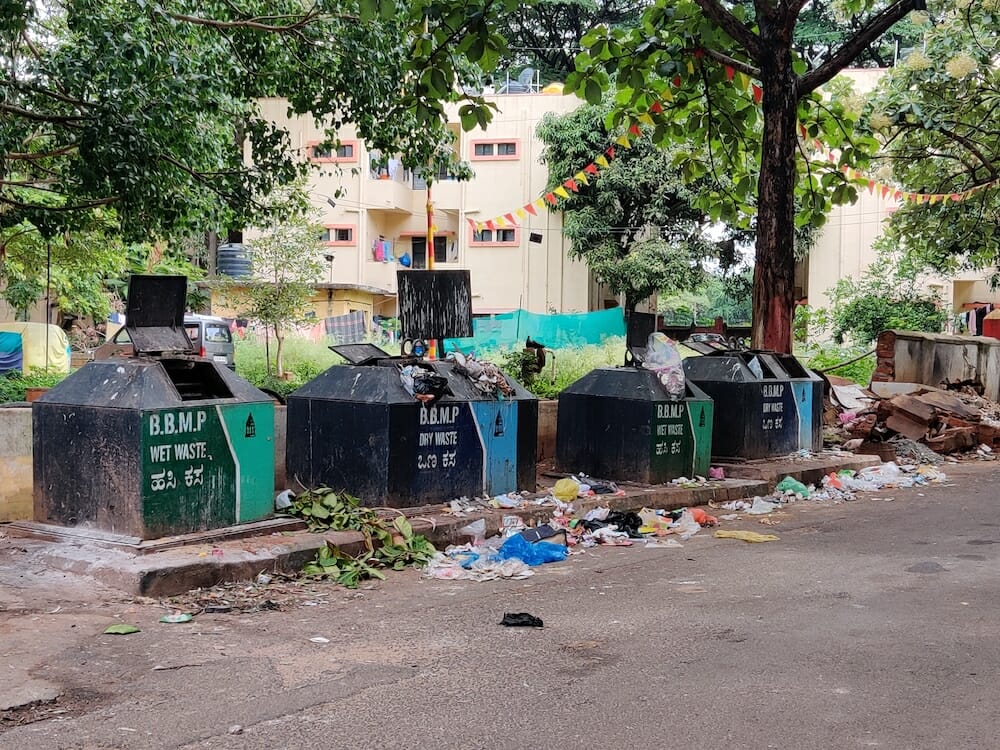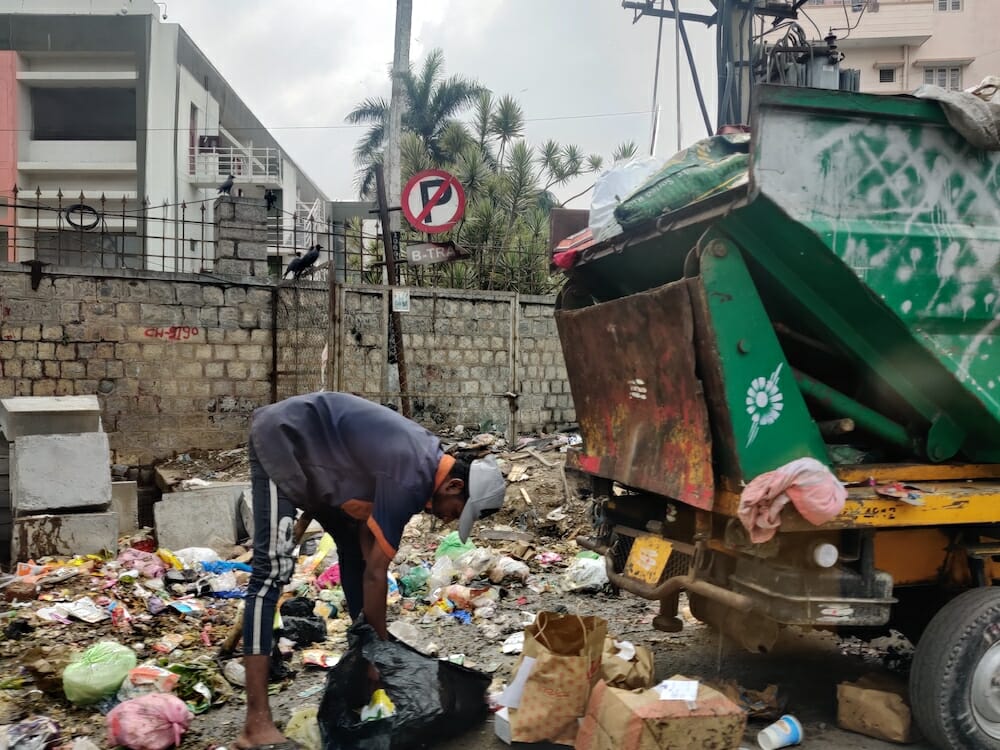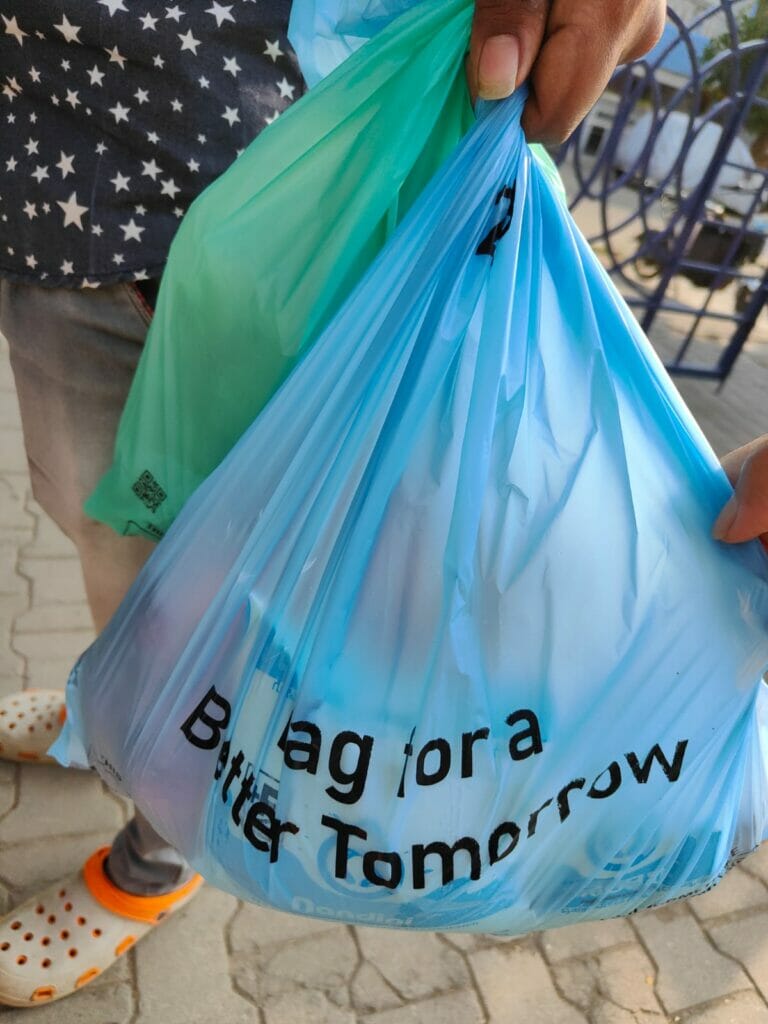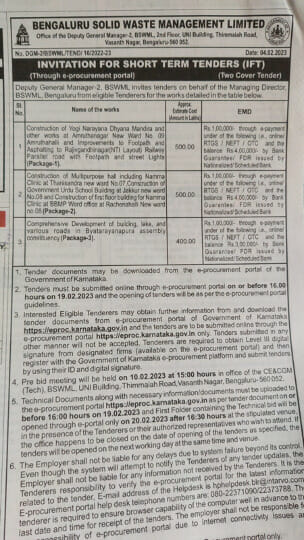Waste activist Odette finds streets littered and garbage piles everywhere during her morning walks in Domlur. Nagraj, also known as Plog Raja ,continues to organise weekly clean up drives. More than 12 years after the SWM PIL got BBMP to start implementing decentralised waste management, why does Bengaluru still have garbage piles everywhere? Why do we continue to rely on illegal dumping grounds? What has the state government done in the last five years?
A recap of solid waste-related developments in the recent term:
- Mushrooming black spots across the city (service roads, below flyovers, lake beds, storm water drains )
- Banned plastic items are literally holding the city to hostage
- Abandoned quarry in North Bengaluru turns into a dumping ground for medical waste
- Storm water drains becomes a prized destination for tender coconut waste
- Missing dustbins in key areas
- Overflowing underground bins
- Construction debris is placed under flyovers and footpaths
- Waste management in markets continues to be ignored
- Banners continue to be flexing their might across the city, despite the ban in 2018
- In 2021, six Dry Waste Collection Centers went up in flames, sabotaging the efforts towards decentralised waste management
- Overflowing landfills and mismanaged SWM plants, causing air and soil pollution, apart from traumatising residents
- BBMP Budgets continue to prioritise landfills
- Proposed changes to the collection system, of partitioned vehicles picking up both wet and dry waste, threatening to disrupt systems put in place
- No provisions for pick up of bulky waste
- The slow process of bioremediation of old landfill sites
- The lack of transparency in the operations of the BSWML and the absence of BBMP elections from 2020, and more.
This list goes on…

Read more: One truck to transport both wet and dry waste: Why this is a problem
Will waste ever be an election issue?
“No”, says Lakshmikanth, a resident of Rajendra Nagar slum. “There are other pressing issues of electricity and water than waste. For us, waste is the least of our concerns”. While waste is an important issue from a climate and environment perspective, it is also a matter of equity and social justice.
Lack of concern for waste workers
But then what about the workers who pick up the waste? A simple act of including pourakarmikas in the Karnataka Heat Wave Action Plan 2022 should have been directed by the State, yet it falls to the activists to advocate for the same.
Where is the access to drinking water? Then there is the case of accidents involving pourakarmikas and their hazardous conditions of work life. What about transportation arrangements for them? That apart, the union has been demanding regularisation of all 26,000 pourakarmikas and that drivers and loaders be brought under direct payment systems.
Since the first occupational ID cards issued in 2011, there hasn’t been any progress on that front of reissuing the same. The lack of identity cards make it difficult for waste pickers from accessing basic amenities such as healthcare, pension, and banking.

What about the state of the processing plants?
In a meeting in January 2021, under the Chairmanship of the Hon’ble Justice Sri Subhash. B. Adi the Chairman, NGT, to review the joint inspection of BBMP’s Waste Processing Plants and landfill sites by KSPCB and BBMP, many gaps and serious issues were identified. For example, the Chikkanagamangala Plant, where the processing capacity is inadequate, leachate is being discharged outside without adequate treatment.
But then there is also the case of the unbearable stench from the Banashankari waste processing unit, which again points to the mismanagement of the existing plants. The other plants facing heat for mismanagement include KCDC and Doddabidarakallu. The other landfill sites – Belahalli, Mitaganahalli all tell a similar story – of neglect, negligence and apathy.
There are also questions on the rationale for BBMP’s 150- tonne garbage transfer stations over the ward wise 25 tonne capacity of transfer centres. The BBMP spent Rs 13 crores for constructing these, along with allocating Rs 9 crores towards maintenance annually. And what happens to areas that were marked for bioremediation and clearing garbage from areas like Mandur? Where is Mandur’s waste going?
Bangalore Mirror, had reported that the garbage is being dumped behind Hoskote Lake. But contrary to the BBMP’s strategy to promote source segregation, the government announced the deployment of Rs 11.49 crores automated segregation centres to separate dry and wet waste.
Banned plastics are back with force, the tokenistic raids notwithstanding. So, when out of 45 cities, having a population of above 10 lakh, Bengaluru slipped down by 15 spots and secured the 43rd rank in the Swachh Survekshan 2022, no one was surprised.
The city has not had elections for its city council after the terms of corporators elected in 2015 ended during the first wave of the pandemic in September 2020. Also, the state government has been governing the city directly, and this definitely has had its influences and varied challenges.

Self-sufficient wards – just talk?
The BBMP announced that they plan to make each ward “self-sufficient”, or ‘Atma Nirbhar’ in wet waste management under the net zero concept. The Chief Minister also announced that wet waste compost processing centres will be set up in each ward and dry waste collection centres will be established in every ward.
While this was something that SWM practitioners and advocates have been demanding for years, there was no action on the ground. Was the announcement just to jump on the net zero bandwagon?
What is BBMP really spending on?
Last year’s budget estimate for solid waste management (2022-23) was Rs 1621.7 crores (revised estimate Rs. 1133.66 crores). For 2023-24, the estimates are Rs 1643.72 crores of which the Grant-in-aid towards the Bengaluru Solid Waste management Limited (BSWML) is Rs 700 crores.
This means BBMP is not spending on the following: push carts and bins; repair and maintenance of vehicles; repair and maintenance of plant and machinery; maintenance of landfills/waste dumping wards/quarries; hire charges for SWM Vehicles; operating costs; outsourced SWM expenses, including Zonta, TPS and dry waste; tipping charges; decentralised composting expenses; design, establishment and operation of scientific landfills; scientific landfill at balance pits of Mittiganahalli and bunds development; village improvement works surrounding BBMP scientific landfills and SWM infrastructure. All that BBMP itself will be doing is spend on salaries for outsourced pourakarmikas, pourakarmika day celebrations and consumables
The budget document states that BWSML will submit an action plan for utilisation of their grant of Rs 700 crores. No such plan is available. There are no work orders or expense reports in the public domain to understand what work has been done. The BWSML does not even have a functioning website.
The Central Vigilance Commission (CVC) directs that all Government and Public Sector Procurement/Tenders/Notifications issued by the Central and State Governments and other public bodies across India for goods, services and works, along with reports must be made available/linked through the websites. But as a non-elected body, who will hold BWSML accountable for doing the right thing? There are instances where this body meant to handle SWM is calling tenders for buildings and lakes!

Read more: Solid waste management: BBMP budget prioritises the worst solution of them all, more landfills
Proposed direction for the next 5 years for the new govt
Last year, the NGT also imposed Rs 2,900 crores fine on the Karnataka government for failing to manage solid and liquid waste. It is no doubt disheartening to see the effort that the city made to promote and enforce segregation of waste at source slowly eroding away.
The ward level data that was captured and shared has also disappeared. But this doesn’t mean that we lose hope.The government needs to be doing more than tokenism, in the name of waste management. And for that they must make the BBMP more accountable and effective and empowered to do so, by first holding elections.
“Every elected representative must focus on sustainable measures that bring real and lasting change to their areas, to make it clean, green and safe, and not short term measures that waste budgets for immediate results, which do not sustain over longer term. So for me, immediate priority is adequate facilities for ward-level processing of waste with wet and dry waste centres, waste tempos, above all ensuring timely payments for those who clean our streets”, says Odette Katrak , Co-founder, Beautiful Bharat.
It is important to streamline door to door collection: “We need more emphasis on three way segregation at source, stricter implementation of door to door collection and imposition of penalties”, says Plog Raja.
Activists also recommend that it is important for the government to implement the bye laws: “
The bye laws identify many actions, including setting up domestic hazardous waste, e-waste, C&D waste; extending the collection and transportation of waste to two or three times a day (day / evening / night collection) from all or certain waste generators, says Nalini Shekar, Co Founder, Hasiru Dala. There are a range of other issues that need to be fixed and this can happen if they follow the SWM Rules and the Karnataka High Court directions
- Act on single use plastics: Stricter monitoring of unauthorised/unverified single-use disposables/plastic manufacturing; arrest this issue at the source level.
- Prioritise Pourakarmikas welfare: Timely payments to the pourakarmikas and more accessible toilets/restrooms for the pourakarmika community.